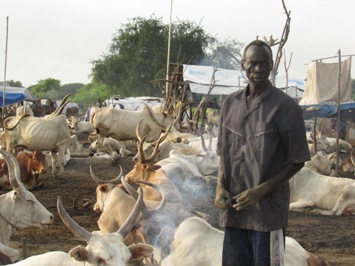Cattle diseases threaten livelihoods in Jonglei capital Bor
September 20, 2014 (BOR) – Local cattle keepers in Bor, the capital of South Sudan’s Jonglei state, said their livelihoods are being threatened by an outbreak of deadly diseases despite intervention by an indigenous non-government organisation (NGO).

“There is milk from the cows and this is our core source of survival,” said Abraham Thon after clearing the ground for his cattle.
However, that source of livelihood is now increasingly under threat.
According to Smile Again Africa Development Organization (SAADO), a surge in cattle diseases such as foot-rot, trypanosomiasis, brucellosis, east coast fever (ECF), flukes and worms has led to the deaths of thousands of head of cattle over the years in Bor.
SAADO livestock program officer Chol Stephen Deng said cattle deaths surged after conflict erupted in South Sudan in mid-December last year, with ongoing insecurity preventing a health officer from travelling to pastoralist hideouts.
“One woman told me she lost two of her three animals [to] ECF, and as widow she lost the sole source of feeding her three children,” said Deng.
SAADO, which has an office in Bor, is implementing a United Nations Food and Agriculture (UN-FAO)-funded project to vaccinate livestock in Bor county.
A total of 71,000 cattle have been vaccinated since April, as well as 133,000 goats and sheep.
“The pastoralist community migrated with their cattle to Toch (an island in the Nile River) for safety for about six months, but the situation is now changing and animals are being moved to areas due to (security) normalcy,” said Deng.
Jonglei state, which is home to six tribes that rear cows, goats and sheep, was the scene of fierce fighting at the height of the conflict.
The conflict has severely disrupted agricultural activities in the country, with UN humanitarian agencies warning of a looming famine later this year due.
The volatile security situation has also made it difficult for cattle keepers to move their animals to better pastures.
Villages in Bor county were left deserted as local residents fled for their lives after fighting erupted between government and rebel forces for control of the strategic town.
Since February, much of the fighting between soldiers loyal to former vice-president Riek Machar and president Salva Kiir has been confined to northern areas of Jonglei.
Those displaced by the fighting are now slowly starting to return to the town, some 200km north of South Sudan’s capital, Juba.
With market prices skyrocketing, milk from cows and goats is the only cheap dietary source for children.
Thon, like other pastoralists in the Tibek cattle camps, is optimistic that the government, in cooperation with NGOs, can help vaccinate cows and control the spread of diseases.
“If our cows survive, then we will survive. But if they die, there will be nothing left for us,” he said.
SAADO’s executive director, Elijah Manyok, said there remain many challenges at stake, including funding.
“But more importantly, peace must return to the country to avoid suffering of the local people,” he said.
Manyok holds both the government and rebel forces responsible for increasing poverty rates among villagers who make their living from rearing cattle.
“Being born to poverty is natural, but living in poverty is [a] man-made [situation],” he said.
SAADO offers training to cattle keepers, particularly women, who remain the backbone of the local economy.
Gabriel Deng Ajak, the director of South Sudan’s Relief and Rehabilitation in Jonglei, said the government is doing everything in its power to help pastoralists.
“Cattle are [the] backbone of livelihoods in this community and we won’t neglect them,” he said at the launching of the livestock health intervention program on Friday.
(ST)
